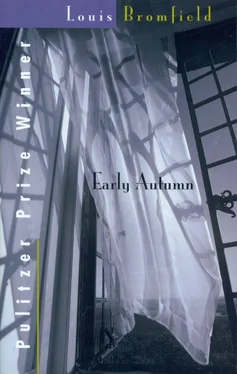“You’re not a child anymore, Sabine,” the old lady said sharply.
“No, certainly I’m not a child anymore.” And the remark silenced Aunt Cassie, for it struck home at the memory of that wretched scene in which she had been put to rout so skillfully.
There was a great bustle about getting the two old ladies under way, a great search for cloaks and scarfs and impedimenta; but at last they went off, Aunt Cassie saying over her thin, high shoulder, “Will you say good-bye to your dear father-in-law, Olivia? I suppose he’s playing bridge with Mrs. Soames.”
“Yes,” replied Olivia from the terrace, “he’s playing bridge with Mrs. Soames.”
Aunt Cassie merely cleared her throat, forcibly, and with a deep significance. In her look, as in the sound of her voice, she managed to launch a flood of disapproval upon the behavior of old John Pentland and old Mrs. Soames.
Bidding the driver to go very slowly, she climbed into her shabby, antiquated motorcar, followed respectfully by Miss Peavey, and drove off down the long elm-bordered drive between the lines of waiting motorcars.
Olivia’s “dear father-in-law” was Aunt Cassie’s own brother, but she chose always to relate him to Olivia, as if in some way it bound Olivia more closely, more hopelessly, into the fabric of the family.
As the two younger women reentered the house, Olivia asked, “Where’s Thérèse? I haven’t seen her for more than an hour.”
“She’s gone home.”
“Thérèse … gone home … from a ball given for her!”
Olivia halted in astonishment and stood leaning against the wall, looking so charming and lovely that Sabine thought, “It’s a sin for a woman so beautiful to have such a life.”
Aloud Sabine said, “I caught her stealing away. She walked across to the cottage. She said she hated it and was miserable and bored and would rather be in bed.” Sabine shrugged her handsome shoulders and added, “So I let her go. What difference does it make?”
“None, I suppose.”
“I never force her to do things of this sort. I had too much forcing when I was young; Thérèse is to do exactly as she likes and be independent. The trouble is, she’s been spoiled by knowing older men and men who talk intelligently.” She laughed and added, “I was wrong about coming back here. I’ll never marry her off in this part of the world. The men are all afraid of her.”
Olivia kept seeing the absurd figure of Sabine’s daughter, small and dark, with large burning eyes and an air of sulky independence, striding off on foot through the dust of the lane that led back to Brook Cottage. She was so different from her own daughter, the quiet, well-mannered Sybil.
“I don’t think she’s properly impressed by Durham,” said Olivia, with a sudden mischievous smile.
“No … she’s bored by it.”
Olivia paused to say good-night to a little procession of guests … the Pingree girls dressed alike in pink tulle; the plump Miss Perkins, who had the finest collection of samplers in New England; Rodney Phillips, whose life was devoted to breeding springers and behaving like a perfect English gentleman; old Mr. Tilney, whose fortune rested on the mills of Durham and Lynn and Salem; and Bishop Smallwood, a cousin of the Pentlands and Sabine (whom Sabine called the Apostle of the Genteel). The Bishop complimented Olivia on the beauty of her daughter and coquetted heavily with Sabine. Motorcars rushed out from among the lilacs and syringas and bore them away one by one.
When they had gone Sabine said abruptly, “What sort of man is this Higgins. … I mean your head stableman?”
“A good sort,” replied Olivia. “The children are very fond of him. Why?”
“Oh … no reason at all. I happened to think of him tonight because I noticed him standing on the terrace just now looking in at the ball.”
“He was a jockey once … a good one, I believe, until he got too heavy. He’s been with us ten years. He’s good and reliable and sometimes very funny. Old Mr. Pentland depends on him for everything. … Only he has a way of getting into scrapes with the girls from the village. He seems irresistible to them … and he’s an immoral scamp.”
Sabine’s face lighted up suddenly, as if she had made a great discovery. “I thought so,” she observed, and wandered away abruptly to continue the business of “absorbing” the ball.
She had asked about Higgins because the man was stuck there in her brain, set in the midst of a strange, confused impression that disturbed a mind usually marked by precision and clarity. She did not understand why it was that he remained the most vivid of all the kaleidoscopic procession of the ball. He had been an outsider, a servant, looking in upon it, and yet there he was—a man whom she had never noticed before—vivid and clearcut, dominating the whole evening.
It had happened a little earlier when, standing in the windowed alcove of the old red-paneled writing room, she had turned her back for a moment on the ball, to look out upon the distant marshes and the sea, across meadows where every stone and tree and hedge was thrown into a brilliant relief by the clarity of the moonlight and the thin New England air. And trapped suddenly by the still and breathless beauty of the meadows and marshes and distant white dunes, lost in memories more than twenty years old, she had found herself thinking: “It was always like this … rather beautiful and hard and cold and a little barren, only I never saw it before. It’s only now, when I’ve come back after twenty years, that I see my own country exactly as it is.”
And then, standing there quite alone, she had become aware slowly that she was being watched by someone. There was a sudden movement among the lilacs that stood a little way off wrapped in thick black shadows … the faintest stirring of the leaves that drew her sharply back to a consciousness of where she was and why she was there; and, focusing all her attention, she was able to make out presently a short, stocky little figure, and a white face peering out from among the branches, watching the dancers who moved about inside the house. The sight produced in her suddenly a sensation of uneasiness and a faint prickling of the skin, which slipped away presently when she recognized the odd, prematurely wrinkled face of Higgins, the Pentland groom. She must have seen him a dozen times before, barely noticing him, but now she saw him with a kind of illuminating clarity, in a way which made his face and figure unforgettable.
He was clad in the eternal riding breeches and a sleeveless cotton shirt that exposed the short, hairy, muscular arms. Standing there he seemed, with his arched, firmly planted legs, like some creature rooted into the soil … like the old apple tree which stood in the moonlight showering the last of its white petals on the black lawn. There was something unpleasant in the sight, as if (she thought afterwards) she had been watched without knowing it by some animal of an uncanny intelligence.
And then abruptly he had slipped away again, shyly, among the branches of the lilacs … like a fawn.
Olivia, looking after Sabine as she walked away, smiled at the knowledge of where she was bound. Sabine would go into the old writing room and there, sitting in a corner, would pretend that she was interested in the latest number of the Mercure de France or some fashion paper, and all the time she would be watching, listening, while old John Pentland and poor battered old Mrs. Soames sat playing bridge with a pair of contemporaries. Sabine, she knew, wanted to probe the lives of the two old people. She wasn’t content like the others at Pentlands to go on pretending that there had never been anything between them. She wanted to get to the root of the story, to know the truth. It was the truth, always the truth, which fascinated Sabine.
Читать дальше












